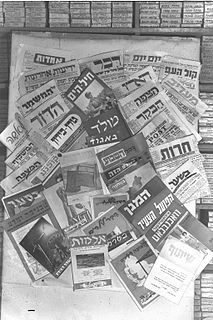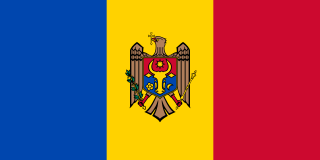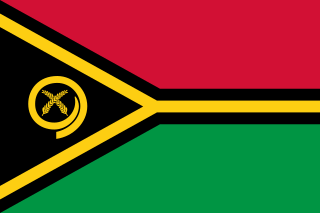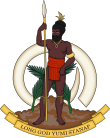
The Media of Poland consist of several different types of communications media including television, radio, cinema, newspapers, magazines, and Internet. During the communist regime in Poland the Stalinist press doctrine dominated and controlled Polish media. The country instituted freedom of press since the fall of communism. The Polish media system's main features are the product of the country's socio-political and economic post-communist transition. These features include: the privatisation of the press sector; the transformation of the state radio and television into public broadcasting services; influx of foreign capital into the media market and European integration of audiovisual media policies. Today the media landscape is very plural but highly polarized along political and ideological divides.
This article is about the communication systems in Vanuatu.
The media of Belarus are mass-media outlets based in Belarus. Television, magazines, and newspapers are operated by state-owned and for-profit corporations and depend on advertising, subscriptions, and other sales-related revenue. The Constitution of Belarus guarantees freedom of speech, but this is contradicted in practice by repressive and restrictive laws. Arbitrary detention, arrests, and harassment of journalists are frequent in Belarus. Anti-extremism legislation targets independent journalism, including material considered unfavourable to the president.
The media of Mali includes print, radio, television, and the Internet.
Media of Morocco includes newspapers, radio, television, and the Internet.

The media of Israel refers to print, broadcast and online media available in the State of Israel. The country boasts dozens of newspapers, magazines, and radio stations, which play an important role by the press in political, social and cultural life and cater it to a modern, developed and literate society.

Media in Sierra Leone began when the first modern printing press in Africa arrived at the start of the 19th century. In the 1860s the country became a journalist hub for Africa with professional travelling to the country from across the continent. At the end of the 19th century the industry went into decline and when radio was introduced in the 1930s this became the primary communication media. Print media is not widely read in Sierra Leone, especially outside Freetown, partially due to the low levels of literacy in the country. In 2008 there were 15 daily newspapers in addition to those published weekly. Among newspaper readership young people are likely to read newspapers weekly and older people daily. The majority of newspapers are privately run and are often critical of the government.
The media of Armenia refers to mass media outlets based in the Republic of Armenia. Television, magazines, and newspapers are all operated by both state-owned and for-profit corporations which depend on advertising, subscription, and other sales-related revenues. As of 2018, there were few indicators of a healthy and independent media.

The media of Moldova refers to mass media outlets based in the Republic of Moldova. Television, magazines, and newspapers are all operated by both state-owned and for-profit corporations which depend on advertising, subscription, and other sales-related revenues. The Constitution of Moldova guarantees freedom of speech. As a country in transition, Moldova's media system is under transformation.
This article is about the print, radio, television, and online media of Iraq. As of 2005 about 80 radio stations and 25 television stations were broadcasting to Iraq in Arabic, Kurdish, Turkmen, and Neo-Aramaic.

Media in Kenya includes more than 90 FM stations, more than 60 free to view TV stations and an unconfirmed number of print newspapers and magazines. Publications mainly use English as their primary language of communication, with some media houses employing Swahili. Vernacular or community-based languages are commonly used in broadcast media; mostly radio.
The media of Syria consists primarily of television, radio, Internet, film and print. The national language of Syria is Arabic but some publications and broadcasts are also available in English and French. While television is the most popular medium in Syria, the Internet has become a widely utilized vehicle to disseminate content. Transcending all available media, the government seeks to control what Syrians see by restricting coverage from outside sources. Publications and broadcasts are monitored by members of the government. Syria is ranked as one of the most dangerous places in the world for journalists. There were 28 journalists killed in combat in 2012.
Media in Niger is a diverse collection of public and private entities, both print and broadcast, centered in the capital of Niamey, but with vibrant regional centers. The media has historically been state funded, and focused on radio broadcast media, as the nation's population is spread over great distances. Niamey boasts scores of newspapers and magazines, many of which are fiercely critical of the government. These papers though have very small circulations, and almost none outside the cities.
Television Blong Vanuatu (TBV) The digital service is now a joint business venture between VBTC and Guilin CEKE Communication Equipment Co Ltd, a Chinese private company that is specialised in digital television.. Their studios and offices are located in Port Vila.

Media in the Democratic Republic of the Congo are both nationally and internationally state owned and operated.
Media in Ivory Coast is controlled by the government. Audiovisual communications are regulated by the Conseil national de la communication audiovisuelle (CNCA), an administrative arm of the national government.
Media in Zambia consist of several different types of communications media: television, radio, cinema, newspapers, magazines, and Internet-based Web sites. The Ministry of Information, Broadcasting Services and Tourism is in charge of the Zambian News Agency which was founded in 1969.
Media in Namibia includes radio, television, and online and print formats.











